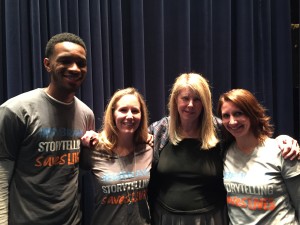What is a mental health diagnosis anyway? How do you know if you need a diagnosis? As someone living with a serious mental health condition for the past seventeen years, I hope I may be able to shed some light on this for you, and explain why receiving a proper diagnosis is the first step to my mental health mindset.
Read moreSetting My Writing Intention
I am living proof that just because a person is living with a mental illness doesn't mean they can't work hard to manage it well and this blog is my way of giving back.
Read moreRelapse {written in September 2017}
Photo credit: Alicia Bruce
You're sick again, feeling like a failure because for so long, you had it under control. You had the upper hand, maybe even had won. But unfortunately with conditions of the mind, there are no cures yet. These are lifelong diseases we are tasked with controlling.
Read moreThis Month Marks 15 years Living with Bipolar
After fifteen years of living with a serious mental illness, I’ve learned that my mental health is something I need to take care of every day in order to maintain mental wellness, and there are many facets to it.
Read moreI Landed in the ER after watching '13 Reasons Why'
Four days ago I finished watching the Netflix series ‘13 Reasons Why’ and drafted an opinion piece which I published Monday morning. The show rocked me to my core. So much so, that I landed in the Emergency Room of my local hospital. This is the story of how and why that happened.
 I live with type 1 bipolar disorder. For those who aren’t aware of the various types of bipolar disorder, Bipolar Hope Magazine is an amazing resource and they have an informative section on their website which describes the types of bipolar and different symptoms. In a nutshell, my type of bipolar disorder means that I lean towards the manic side of the condition. If I’m not careful to protect my sleep, I could find myself launching into a manic episode. It doesn’t happen overnight, rather, over the course of several nights of getting little to no sleep.
I live with type 1 bipolar disorder. For those who aren’t aware of the various types of bipolar disorder, Bipolar Hope Magazine is an amazing resource and they have an informative section on their website which describes the types of bipolar and different symptoms. In a nutshell, my type of bipolar disorder means that I lean towards the manic side of the condition. If I’m not careful to protect my sleep, I could find myself launching into a manic episode. It doesn’t happen overnight, rather, over the course of several nights of getting little to no sleep.
As I mentioned in my opinion piece, I put my mental health at risk by choosing to watch the show. I didn’t know how risky it was to begin watching the show because I’ve been mentally healthy for the past 7 years. The last time I was hospitalized for a manic episode was, ironically, exactly seven years ago this month, when I was 5 weeks pregnant with my second child. I thought since I had been so stable for so long, it couldn’t possibly be that risky to watch a few episodes.
I was wrong.
I started watching the show Friday evening, and got through four episodes (binging) before forcing myself to shut it off so that I could get some sleep before flying to Cedar Rapids, Iowa for my nonprofit’s show the following night. Our Iowa Corridor This Is My Brave show was incredibly moving and inspiring, as all of our shows are, and I was so excited to get to spend time with the show’s producers and cast members afterwards. We went out to a local bar and played Cards Against Humanity while eating and hanging out. I had a blast. But unfortunately didn’t get to sleep until 2am EST, and awoke at 6am Sunday morning. I usually sleep well when I’m on the road, but I had so much on my mind having started watching the show the night before and wanting to continue watching.
I pushed play on episode 5 shortly after waking up, and was able to finish the series in the airport on my way home on Sunday. I was furious by the time I finished, and reached out to several of my friends via text to see if they had watched and to get their thoughts. Everyone seemed to have similar feelings, but slightly different reactions. Overall, the few people I was able to connect with directly were shook up by the show, but were glad it was out and was opening the eyes of the public.
At that point I began thinking about those in my circles who were already vulnerable, sensitive. How would they take it if they had watched? How would teenagers react to the show? Especially if they didn’t have solid support systems in place, if they were already in a tough place, if they didn’t have the energy or resources to access proper mental healthcare.
I landed around 8:30pm and grabbed an Uber home. I normally enjoy chatting with the driver, but on this particular ride I needed to connect with one of my close friends. I called my This Is My Brave Co-Founder Anne Marie Ames. She and I have been friends for four years, and I needed to tell her how the show affected me. We talked the entire ride home, and agreed to catch up again during the week.
My husband had let our kids stay up late so they could see me, so I hugged and kissed my little people and got them tucked in by 9pm. My husband knew how I was feeling because I had called him from the airport, and he knew that I wasn’t sleeping well. The plan at that point was to focus on sleep all week, make it a priority again. On the flight home from Chicago I had jotted down my feelings and initial reaction to '13 Reasons Why', and I told him I felt that if I was able to get them organized into a piece that made sense, I’d likely sleep better. I started pulling my thoughts together, tapping away at my laptop, and he went up to bed.
I crawled into bed around midnight, as it had taken me longer than I had hoped to draft my reaction. But I did feel better once I got it out, so I was hopeful I’d be able to get some quality sleep.
Only, instead of crashing and sleeping hard, my sleep was broken and riddled with nightmares. I woke at 5:30am, and since my husband was already downstairs doing his normal early morning workout in the basement, I grabbed and pen and paper and let my feelings flow again. I shot off a draft of my revised piece to two friends and by then it was time to wake the kids and get them off to school.
I recognized my symptoms of hypomania and immediately told my husband that I was going to call my psychiatrist at 8:30am when they opened to get an appointment. He said that he thought that was a good idea and off my family went to work and school. I normally find relief in the calm of the morning once the house is quiet and I’m on my own. But instead I found myself feeling that familiar current of mania beginning to rush through my blood and anxiety creeping in.
I still hoped I could relieve some of these symptoms by publishing my reaction to the show. I felt a little better after hitting Publish on Medium, but things escalated quickly from there.
I picked up my kids from school and took them out for frozen yogurt, one of our favorite treats. I hadn’t seen them all weekend, so it was fun to catch up. As we were sitting there, Kelly, my best friend from college called to see how our Cedar Rapids event had gone. I told her it was amazing, as all our events are, but that I had a lot on my mind. She caught on immediately that I wasn’t in a good place, probably based on the tone of my voice, but I told her I couldn’t talk because of where we were and the kids were with me. She offered to pick up the groceries I said I’d be running out for later that evening, so that I could head to bed early instead. She agreed to meet me back at my place in ½ hour.
{One of the things Kelly asked was critical for her to know how I was doing mentally, and she knows this from being there when my very first manic episode came on back in December of 2005. She asked me where I was on a 10-point scale. I was at a 6-7.}
When a person with type 1 bipolar is at a 6-7, it means that they’re in a hypo-manic state. A person can very quickly go from a 6-7 to a 9-10, meaning they need to be admitted to a psychiatric hospital, if things aren’t addressed in an urgent manner.
Once we were home, I did my best to summarize for Kel why the show '13 Reasons Why' affected me so deeply. She’s a teacher, and hadn’t heard of the show, but when I told her how I had met a friend of mine for coffee that afternoon, she had a better understanding. The friend I met up with had been directly impacted by suicide, as her son Jay took his life last year, and now the family is pursuing a lawsuit because Jay’s guidance counselor had been alerted by a friend three weeks before he took his own life. The counselor had neglected to contact Jay’s parents. You can read about it in the Washington Post.
Little did I know, Kelly had already set an emergency intervention plan into place, even though she may not have noticed it at the time. While she was picking up the groceries for me, she called my husband and let him know that she was concerned about me. She also texted another one of our close friends from college who had a friend who was a pharmacist. (What can I say? It takes a village.)
When Ben got home, he found the kids happily playing video games, while Kelly and I were sitting in the dining room trying to figure out a plan. I needed Ambien to ensure that I got a solid night’s sleep. The only problem was that I hadn’t used a sleep medication in seven years, so we didn’t have anything (expired or otherwise) in the house. We called my psychiatrist’s office to see if we could get through to an after-hours line. We left a message for my doctor’s medical assistant, but by then it was already 6pm and we were running out of time. We called my regular pharmacy, but my psychiatric medication info was out of date. (Side note: I use a mail-order pharmacy to fulfill my regular mood stabilizer prescription which I’ve been on for the past 7 years at the same dose.) The pharmacist at my regular pharmacy recommended an over-the-counter sleep aid, but we weren’t convinced that would work for me given my level of hypomania.
Our friend who is the pharmacist (in California) communicated by text that if I didn’t have Ambien on hand at home, I would need to go to the Emergency Room to get a prescription for it, and that was what she recommended given my symptoms. I argued it was overreacting, but based on my experience living with this condition for eleven years now, and my past 4 psychiatric hospitalizations for mania, I also knew she was right.
Kelly offered to drive me to the hospital while Ben held down the fort at home. I resisted at first, as it seemed dramatic and unnecessary. I wanted to just get an OTC sleep med, and said we could get Ambien the next day from my psychiatrist. But looking back now, it's a good thing I didn't resist as I could have ended up in handcuffs again, being carted off to the Emergency Room and then the psychiatric hospital. I didn't want my kids to have to see that happen, so I happily went along with the intervention plan.
We joked on the drive over about how efficient my intervention team was and how I was voting her President of the team based on her stellar performance. (In college, Kelly was President of the water polo team and I was Vice President, so it seemed fitting.) We were immediately admitted to the ER, the intake nurse took my vitals, and I was sent back to a triage room with a bed. By that point I had called my parents to let them know what was going on, letting them know the plan and that we had everything under control. They were worried but relieved, and asked that I keep them posted.
The ER doc was really great, and got us in and out quickly with a script for the Ambien that hopefully would do the trick and get me through until I saw my psychiatrist on Wednesday. Ben had called his mom and she was already at our house by the time I was getting my discharge papers, and he met us at the hospital right as I was released so that he could drive me to get my script and Kelly could head home to her family.
Ben’s mom got the kids in bed as I called my parents to update them once we got home around 8:30pm. I ate a little something for dinner, and was crawling into bed by 9:30, ready to let the meds do their trick and lull me into a deep sleep.
Only it didn’t exactly work as planned.
I slept from 10pm until I woke at 1:30am, unable to get back to sleep. Hypomania/mania has a way of doing that to a person. I woke my husband and told him I couldn’t sleep, so I took another dose of the sleep med. I woke groggy at 6am Tuesday morning. Concerned that I had to take two doses, when in the past one dose had worked for me, we called to bump up my psychiatrist appointment, and luckily she had a slot in her schedule for Tuesday afternoon.
My husband was able to take time off from work to drive me to my psychiatrist appointment. We filled her in on everything that had happened, and made a new plan including medication changes. She provided us with her emergency contact info in case we needed it, and answered all our questions. We were in and out in an hour total. My mother-in-law was able to help us with our kids while my husband went back to work for the afternoon and I went to run a few necessary errands, including picking up my new prescription. My therapist (who I haven’t seen since December, because I’ve been “busy”), has an awesome online scheduling tool for current clients. I grabbed one of her only two open appointment slots for Thursday.
Tuesday night we followed the plan. It was extremely difficult to get out of bed Wednesday morning due to the side effects of the medication changes. I haven’t had trouble getting out of bed because of my mental illness for so many years that I forgot what it felt like. It’s hell.
My anxiety has returned due to this “almost-episode,” which is totally normal. It’s just been so long since I’ve felt it that it’s been a little overwhelming. Uncomfortable, yes. Manageable, yes. Especially when I have such an incredible support system and so many resources at my fingertips.
I may have been able to stay mentally healthy for seven years, and yes, that's a long streak. But if this week has taught me anything it's that I'm not immune to relapses. I live with type 1 bipolar disorder and I'll always have it. Like any other chronic condition, it's lifelong. I'll continue to kick bipolar's ass, I know I will. I'm even a little grateful for this week's experience because I had been feeling like a bit of an imposter lately, having not felt symptoms for so long and getting to do this nonprofit work where I hear stories of individuals overcoming mental illness every week. I'll forever be a member of the club, my tribe, as I call it. And together we're ending the stigma surrounding mental health disorders. One true story at a time.
*****
About a year ago, I wrote a guest post for a website called OC87Recovery Diaries, and in it, I stated that we didn’t have a plan. The reason I’m publishing this post is not to highlight how fortunate I am, but to point out how I almost landed in a psychiatric hospital this week, but didn’t, because we had a plan. It may not have been a formal, executed WRAP (Wellness Recovery Action Plan), but it was darn near close, and it worked.
If you or someone you love lives with a mental illness, it's important to have a plan. And if you're in a tough place right now - here are some things I find helpful:
- Know your local and national mental health resources, including the crisis hotlines. This Is My Brave's Resources page is a great place to look, or even just Google it and keep that info handy.
- Make sure you know how to contact your psychiatrist after-hours in case of emergency.
- Keep a journal that lists the meds you're currently taking and what's working for you. Allow those closest to you to have access to this in case of emergency.
- Don't be afraid to be completely honest about how you're feeling. Feeling overwhelmed, triggered, fragile, etc., and sharing your feelings with those you trust is NOT weakness. In fact, it's the complete opposite. It's brave to allow yourself to be that vulnerable and it leads to deeper, more close-knit relationships with the people you love.
- Don't lose sight of self-care. We often get so wrapped up in our day-to-day lives that we forget to take time out for ourselves, and being too "busy" can lead to burn-out and mental health issues.
Touched With Fire: a movie about bipolar's mania
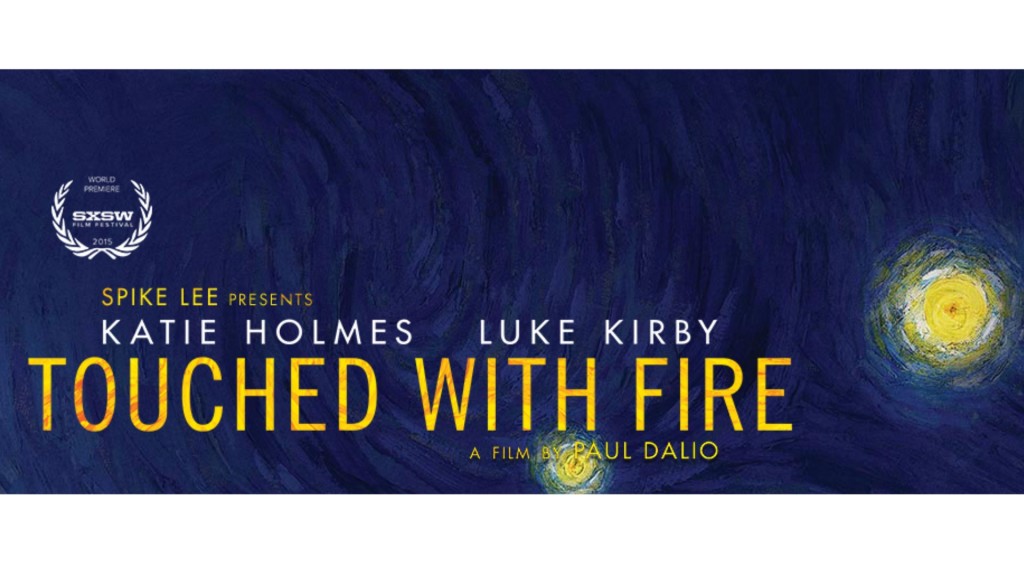 When I received an email recently with an invitation from Mental Health America to attend a free screening of Touched With Fire a new film about bipolar disorder starring Katie Holmes and Luke Kirby, I RSVP'd immediately. It fascinates me to view my illness through the eyes of another person touched by this diagnosis. And this film was written, music composed and was directed by a man who lives with bipolar illness.
When I received an email recently with an invitation from Mental Health America to attend a free screening of Touched With Fire a new film about bipolar disorder starring Katie Holmes and Luke Kirby, I RSVP'd immediately. It fascinates me to view my illness through the eyes of another person touched by this diagnosis. And this film was written, music composed and was directed by a man who lives with bipolar illness.
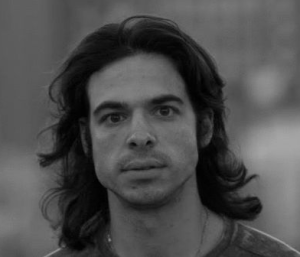 Filmmaker Paul Dalio was diagnosed with bipolar disorder at the age of 24, and like me, struggled to accept the label. He said he romanticized the mania, pointing to famous poets and writers who shared the condition. He's developed a strong sense of pride and I could wholeheartedly relate. It seems his experience over the years has led him to a place I find myself in now: able to live in harmony with bipolar, with a loving family and a full life.
Filmmaker Paul Dalio was diagnosed with bipolar disorder at the age of 24, and like me, struggled to accept the label. He said he romanticized the mania, pointing to famous poets and writers who shared the condition. He's developed a strong sense of pride and I could wholeheartedly relate. It seems his experience over the years has led him to a place I find myself in now: able to live in harmony with bipolar, with a loving family and a full life.
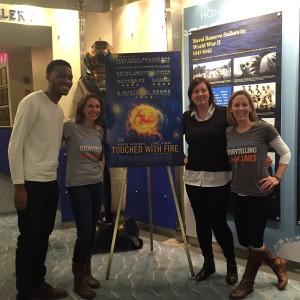
Several of my volunteers and one of our new This Is My Brave interns joined me at the screening. We all were impressed by the film, it's ability to express the artistic side of the disease, how family members struggle with how to help or walk away, and what happens when one refuses to comply with medications and treatment.
Plus, it's a love story. That was probably my favorite part about the movie. And it has a great ending.
I did have a concern as I reflected back on the scenes and the dialogue though. So many moments brought me back to my initial diagnosis and the years that followed.
Like when my parents kept referring to what was happening to me as "episodes" which made me feel so broken.
And when I questioned whether I even had bipolar disorder. I didn't think I needed the meds.
And the times I went off my meds (to protect my unborn babies) only to end up manic and hospitalized within a week both times.
I worry that the film will be dangerous to those who are not in a solid place of recovery. It's been ten years since I've been diagnosed. Coming up on six years since I've had a manic episode requiring hospitalization. I'm at a place where I know that I will never go off my meds. I know what my triggers are and I know how to manage them. I take such better care of my body and my mind compared to where I was back when I was still learning to understand my condition.
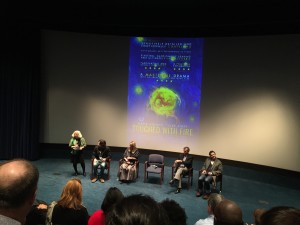
Someone who is early in their recovery journey may be tempted by the film to get rid of meds, to go back to life before being medicated because they were so much more artistic (not true). Paul, the filmmaker, even commented on the fact that he's so much more able to utilize his creativity to attain his goals and dreams being on medication and stable. Something that Dr. Kay Jamison taught him when they met and she became a mentor to him, a connection made possible by his own psychiatrist.
Speaking of Dr. Jamison, she makes a cameo in the movie and I got to say hello to her after the screening and Q & A. I told her how much I admired her work and how I attended one of her book signings in 2007 and asked her about pregnancy and medication. Her advice to me was to stay on my meds, which I did not heed and learned my lesson the hard way. She was very glad to know of the work This Is My Brave is doing and I'm hopeful she'll be able to attend a local show in the near future.
You never know how someone will respond when you put your story out there, when you put your art out into the world. Paul has taken a risk that was no doubt worth taking. My hope is that the film will not live up to my concerns, but instead serve as a springboard for important conversations surrounding mental illness and mental health that need to be taking place in communities everywhere.
The film opens tomorrow, February 12th in New York City and Los Angeles, and on February 19th nationwide in select cities. You can watch a trailer of the film HERE. This Is My Brave is hosting a Meetup for anyone in the DC-metro area who would like to come together to support the film's opening weekend. Click here to sign up to meet us on Friday at the Angelika Film Center in Fairfax for the 7pm-ish showing.
My {In}voluntary Commitment and Why You Should Care
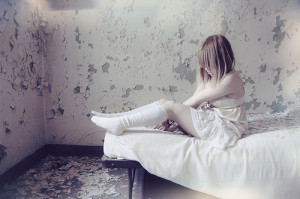 Photo Credit: yyellowbird via Compfight cc
Photo Credit: yyellowbird via Compfight cc
Our bedroom door creaked slowly open at 6:35am this morning and my little man crawled under the covers next to me while my husband finished getting dressed for work. As I felt the chill of little toes brush my warm legs, I thought back to this same day, five years ago, when my mania had reached the breaking point.
I had begun to cross the threshold, going from highly manic to the inevitable psychosis, when my husband took matters into his own hands and called 911 for help.
What a stark comparison to today, I thought, as I reached into my sock drawer to fish out my psych ward socks. I pulled them on this morning as a way of honoring my past, while at the same time recognizing how far I’ve come and how I don’t ever want to go back.
~~~~~~~~~~~~~~~~~~~~~~~~~~~~~~~~~~~~~~~~~~~~~~~~~~~~~~~~~~~~~~~~~~~~~
If your father were having a heart attack, or symptoms consistent with those of a heart attack, you would rush him to the hospital where he would receive treatment. If your child had a 104 fever and was gravely ill but refused to take any medicine, you would call your pediatrician who would tell you to rush the child to the Emergency Room where he would receive medical assistance.
But if someone you loved were experiencing a mental health crisis and needed to see a psychiatrist or be involuntarily committed to a psychiatric facility to receive treatment, you wouldn’t believe the obstacles you have to surpass in order to get them the care they need to get well.
I know, because my family and I plunged head first into these roadblocks in the U.S. mental healthcare system five years ago when I was hospitalized for postpartum psychosis after the birth of my first child in 2008. Writing about this experience was something I wanted to do in order to educate people about the policies surrounding access to mental health care in the state of Virginia. {The laws vary by state. A good resource with links to studies and comprehensive information is MentalIllnessPolicy.org.}
In researching my mental illness and the treatment I received during my hospitalization, I requested copies my medical records from the hospital. I’d like to take you back to the week of October 22nd, 2008, approximately four weeks after I had given birth to my son. Belly still swollen, breasts leaking milk, I lost touch with reality during the early hours of that cool fall morning, but remained silent about my growing sense that this would be my last day on earth.
I was terrified of being taken away from my baby even though there was a little voice in the far corner of my mind urging me to go. I just didn’t want to listen.
That morning my husband knew from my past two manic episodes that I needed to be taken to the hospital. He called his mom and sister to come over and help, as we had been through this before and he knew my erratic manic behavior would require more than one person assisting in the effort to get me ready to be transferred. His next call was to dial 911, where he explained to the dispatcher that I had a bipolar diagnosis, was off my meds because of having just had a baby, and was now rapidly deteriorating and we were in need of help to get me to the hospital. He then called my psychiatrist, leaving her a message to tell her what was going on. And lastly he called my parents in Florida to alert them as well.
I remember being on the phone with my Dad while sitting on a chair in the kitchen, talking to him on speaker phone while the two female police officers who had been dispatched to our house were standing right before me. He was pleading with me to go with them. I don’t recall much, other than being afraid. I don’t know exactly how much time passed, but eventually they were able to take me, in handcuffs, under a Temporary Detention Order (TDO), to our local hospital for an evaluation.
I was clearly manic to the point of psychotic. It was well documented in the detention order paperwork that I had reported hearing voices and seeing ghosts in the baby’s room. My husband had told the officers that I had only slept 3-4 hours a night for the four nights leading up to his call for help. His sleep estimates were correct - it had been the weekend of our son’s baptism and I was trying to prepare for out-of-town guests along with getting everything ready for the party we were hosting. On top of learning to care for our new baby and suppressing the mania that I had felt since the night he had been born, it all caught up to me.
The Temporary Detention Order allowed my husband to have me sent to the hospital for an assessment. My husband was my Petitioner - the person asking that I be involuntarily committed. We were led to an empty hospital room where I was handcuffed to the metal bars of the hospital bed. My husband stayed by my side the entire time. The nurses assessed me and it was determined that there was substantial likelihood that, as a result of my mental illness, in the near future I would suffer serious harm due to a lack of capacity to protect myself from harm. I refused all meds in the Emergency room and I met the criteria for involuntary admission to a psychiatric ward of the hospital, not to exceed a 30-day stay.
I was taken by police car, still handcuffed, to our local hospital’s geriatric psychiatric ward, the nearest facility with a bed available. By the time the bed had become available, it was late at night and I remember being terrified upon entering the facility because of the Halloween decorations festively decorating the glass doors which were pulled open for me. My throat closed and I struggled to breathe, leaning all my weight back, attempting to keep them from guiding me in. They eventually coaxed me in and a young attendant began working with me to get me through the intake process. I remember her arms, covered with tattoos. Her name was Jenny.
They tried to give me drugs to force me to sleep, but my mania was so rampant and I continued to refuse oral medication, so I was given an injection to tranquilize me and my body succumbed to the rest it so desperately needed. I woke groggy, and still very ill.
The Temporary Detention Order meant I could be held involuntarily for one to five days, until a commitment hearing could be held. I was admitted the night of October 22nd, and my commitment hearing was scheduled for 9am on the 24th.
After only thirty-six hours of psychiatric care, I was still extremely sick and my mania was apparent to everyone close to me. But the chemical imbalance that was still working itself back to balanced with the help of the meds and forced rest, wasn’t severe enough to present me as a threat to myself or others during the trial, and despite my family’s strong arguments that I was not well enough to go home and care for myself, let alone a newborn, the judge still deemed me well enough to not be held against my will.
I was free to go home. Case dismissed.
My father spoke with the judge immediately following the trial’s conclusion. He was shocked and couldn’t believe the judge was going to send me home in the condition I was in. My father then asked if they (my family) were able to convince me to stay in the hospital, voluntarily, would I be able to stay?
The judge informed him that yes, I would of course be able to stay on a voluntary basis, but on the same token, I’d be able to sign myself out at any time.
This news was plenty good enough for my family and they immediately began encouraging me to stay and rest, so that I’d be able to return to my newborn baby in a much clearer state of mind. They knew that with just a few more days of treatment and solid sleep, I’d be in a significantly better place to where I could continue to see my outside psychiatrist and work on making a full recovery.
Fortunately, I was well enough to rationalize their concern for me and that was all it took to convince me to sign myself in. I stayed for three more days. My husband and dad came to visit me every day to check on my progress. They used my somewhat still disoriented state to their advantage as they were able to remind me each day that “we all needed to be in agreement that it was the right time for me to go home,” and I was too fragile mentally to process what had happened in the hearing so I followed their lead. I had signed myself in to stay and could leave when I was ready, but I didn’t really comprehend it all at the time.
I called home daily to check on my baby and asked them to bring pictures to the hospital. He changed so much in that week that I missed. His wispy brown hair on top fell out, so he had a bald head with only hair on the sides and around to the back. I cried at a picture they brought me of him smiling on his back laying on a blue and green striped baby blanket. Desperate to get back to my son, I eagerly took my meds each day and night, and did my best to be a model patient.
I signed myself out of the hospital on the 27th, after a 5-day stay, and walked into the kitchen of my house where my mom was stirring a pot of homemade chicken noodle soup cooking on the stove. I made my son a bottle of formula and sat on the couch to learn the art of bottle feeding him after having spent a month perfecting breastfeeding. I will never forget that moment. While feeding him and gazing into his eyes I silently vowed that I would do everything in my power to stay healthy for him. I never wanted to be taken away from him again.
Some people might say that involuntary commitment laws take away a person’s constitutional right to freedom. I completely disagree.
My family sought help for me because they knew I was so severely ill. The system initially determined I was a threat to myself, but the judge at the commitment hearing determined that was no longer the case. Situations like this happen all the time due to the current state of our mental health system and unfortunately, these holes in the system are what contribute to tragedies like Virginia Tech, Sandy Hook or the Navy Yard shootings. It’s the subjective “threat to themselves or others” which is determined by someone who has never met the mentally ill person, which is what needs to change.
People who are aware of family or friends who have mental health issues (and we all know someone given the statistic of 1 in 4 Americans living with a mental illness) need to be more proactive when they sense a change in someone’s behavior. By paying attention to the fragile mental states of people within our own environments, we will be able to push for help before it’s too late. The mental health laws need to be reviewed and modified to permit family and friends to have the ability to have people in trouble involuntarily committed for longer periods of time, so they are better able to make bigger strides towards recovery during the time in which they are under the hospital's psychiatric care. Until this done, we will continue to see more tragedies.
~~~~~~~~~~~~~~~~~~~~~~~~~~~~~~~~~~~~~~~~~~~~~~~~~~~~~~~~~~~~~~~~~~~~~
On this fifth anniversary of my TDO and subsequent voluntary psychiatric commitment, I’m able to smile at my son’s insistence on dressing up as a ghost for Halloween. Five years ago I was not taking my medication and therefore went through hell, reportedly saw ghosts, and thought the world was coming to an end. But today I’m cutting eye holes out of a white sheet to dress my little man up on the last day of this month. A costume which serves as a gentle reminder of my past, while allowing me to appreciate the invisible challenges which inevitably lie ahead.
Brave Because I Want To See Society Change
I learned of yesterday’s shooting here in Washington, DC, via the news pouring into my Twitter feed about the woman who had crashed her car into the gate surrounding the White House. There was speculation that a child was in the car with her at the time. There was also speculation that she suffered from mental illness.
Then she was shot by police and died soon after. The baby, thankfully, was unharmed in the ordeal and is now in the custody of child protective services.
I am so utterly heartbroken for this woman, her child, her family and friends and our society.
This needs to stop.
But unfortunately, until our country stops blaming people with mental illness for their conditions and starts providing the mental health services they need to get well, incidents like what happened yesterday will continue to occur.
We need to come together as a society to talk openly about mental health issues. If you notice someone exhibiting the signs and symptoms of a mental illness, do what you can to help them get the treatment they need. I guarantee you they are too sick to realize they need help.
We need to stop hiding our mental illnesses, because by hiding we are adding to the stigma.
Earlier this year I made the choice to go public with the fact that I live with Type 1 Bipolar Disorder. That I’ve been hospitalized a total of four times for mania, once was postpartum psychosis after the birth of my first child in 2008. That I once was afraid and ashamed to speak openly about my illness.
Today, I am neither afraid nor ashamed of my illness. I am proud to talk openly about my experiences because my openness helps others. They've told me so.
When we come together to share our stories, we propel a movement forward. A movement to shift the way people view the mentally ill. A movement to bring desperately needed changes to the state of mental health services in our country. A movement to stop the loss of innocent lives - both the mentally ill themselves and the people they harm when they are sick.
You see, yesterday’s news could have been me. I suffer from mental illness. But unlike Miriam Carey, I received proper treatment.
And with proper diagnosis and continuous treatment, people with mental illness can lead perfectly productive lives. They can be {and ARE} valuable members of society when they have the support and services they need to get well and stay well.
I don’t like to think about what could have happened if my husband hadn’t reached out for help. But the reality is that whenever a story like this hits the news and the person involved is thought to have “a history of mental illness,” I am brought right back to the torment and the excruciating emotional pain of what we went through as a family the times I was sick.
We need to change the public's misconceptions about mental illness because when people get treatment, lives can be saved.
I recently wrote a manifesto on my experience living with bipolar disorder. It's called Find Your Brave and I hope you'll take a moment to download it here and share. It's part of my effort to encourage people to stop hiding and seek support because we're so much stronger when we come together.
Let’s come together and show the world This Is My Brave.
What I Want You To Know About Postpartum Psychosis
Five years ago today my little man was born.
As for any first-time mom, the excitement and energy of the rush to the hospital to meet him is a bit of a blur, especially given the five years that have flooded my memory since then. Sure, we had the same fears and concerns as any new parents: is he sleeping and eating enough? Are we using the right baby products? When will his umbilical cord heal? Are we doing enough tummy time? But for us, the beginning of our story is quite different than that of most new families starting out.
Because right after he turned four weeks old, I had to be hospitalized for postpartum psychosis.
I knew I was experiencing hypomania from the time that he was placed in my arms around four a.m. the morning after he was born. He tried nursing for the first time and the physical exhaustion and emotional release of having just given birth started to set in. We sent him to the nursery so that I could try to catch up on sleep, but with the nurses checking my vitals every hour due to the C-section, sleep was nearly impossible.
Some people may wonder why I hid my symptoms from the people who could help me. The doctors and nurses who saw me when they came to check on the baby while we were still in the hospital never noticed that I was struggling. My therapist, who saw me when I was three weeks post-partum didn’t detect anything unusual. My husband and my parents could sense something was different about me, but we were all so caught up in the new baby that we pushed my mental health issues to the side and put the needs of the baby first.
I love my son with everything in me, but I know from all that I’ve been through over the past eight years living with bipolar disorder that I need to put my mental health first in order to be the best mother I can for him and his sister.
But in the first few weeks of his life, I didn’t know this. I was just a new mom. Trying my hardest to not screw up. And at the time I thought that meant staying off medication to protect my baby.
I was absolutely determined to breastfeed him. I put so much pressure on myself to make it work that the first week I was barely producing any milk because I was so stressed out and the internal fear that my body wasn’t going to be able to actually make food for my baby was doing just that: stunting my ability to lactate.
We did finally figure the whole breastfeeding thing out, me and Owen. And I nursed him for the first four weeks until I was no longer able to hide the fact that I was losing touch with reality.
I felt as though I was invincible and hardly needed to eat or sleep. The less I slept, the more energy I seemed to have. I never napped when the baby napped because I’d always find something to do around the house that was of course more important than catching up on sleep.
Everything around me had a certain sparkle to it. It was as if I were living in a dream world where everything was amplified and so vivid that I had to stay awake to soak it all in. There was no pain, only the soothing sounds of my baby cooing or crying softly before I picked him up.
It was all very surreal. But when hypomania turns into mania, and mania escalates to psychosis, things can go very wrong.
I am so thankful that my husband realized what was happening and knew exactly what to do in order to fix me.
As hard as it was for him to call 911 and have the police and EMT’s take me to the hospital, he knew that I needed to be separated from my baby for a week in order to get well.
And as much as I mourn the week that I lost with my son, I’m grateful for what I learned and how sharing my story has the potential to help other moms and families out there.
Not enough is shared about postpartum psychosis. Even though it is not nearly as common as postpartum depression, doctors still should discuss the potential chances of the occurrence, specifically in patients like me who had a previous bipolar disorder diagnosis. Society doesn’t understand it and therefore, families aren’t on the lookout for symptoms in new moms. And I’d like to change that.
Women who experience postpartum psychosis are just normal moms who unfortunately have a chemical imbalance in their brains. Some of these women have thoughts of harming their children, and some of them act on those violent thoughts. I was one of the lucky ones who didn't have those intrusive thoughts, but even if I did - that doesn't make me a monster, as my friend Robin wrote on her blog recently.
I’m just a mom, with a 5-year old little man, who wants to prove to the world that our struggles don’t define us. They only provide us with opportunities to make a difference in the world. I’m beginning to work on explaining this to him every chance I get.
I’m loving watching my son grow into a smart, funny, caring, determined and stubborn little guy who has stolen my heart with his hugs and his smile. I’m still in complete awe of the fact that he grew inside of my belly, remembering the pressure of his little feet apparent from the outside. Bringing him into our lives was a miracle and we couldn’t imagine life any other way.
The other day I asked him what he thought it would feel like to turn five. “I’ll be all grown up! A big kid!” was his response. So much like me, he’s eager to make his way in the world, try new things and move mountains. I’m trying my best to just let him be little, to enjoy the carefree afternoons at the playground or the library. To linger over snacktime at home with him while his sister is still napping. And to savor every small moment we have together like our morning hugs and bedtime stories.
Five years have gone by so quickly but I’m not sad about them passing. The collection of countless precious memories which I’ve tattooed onto the inside of my mind are what I carry with me in my heart from the past.
I’m eager to see what the years ahead hold. Both for him, and for his mom who will always be looking on with pride.
On Hiring A New Therapist
Change has always been a hard thing for me. When one season comes to an end, and another sweeps in to take its place, I usually need a good few weeks to adjust and settle in. Take this weekend, for example. I loved celebrating the end of August with our anniversary date night and the two days spent soaking up the end of summer at the pool with friends. But until we ease into our new school routine I’ll be fidgety and uncomfortable with the newness of it all.
Speaking of change, I had to break up with my therapist of five years because she stopped accepting my insurance and there was no way I’d be able to pay the regular office visit amount out of pocket. I’m sad about not seeing her again, and feel terrible about not having the chance to say goodbye at our last visit. But I guess that’s just the way life goes sometimes.
Tomorrow I’ll meet a new therapist who I’ll share details of my life with. It feels like the first day of school when everything is new and I’m excited and nervous at the same time for all the learning I know I’ll do while I’m there. I’m sure I won’t be able to cover my entire mental health history in our first visit. But in the event we do continue on after tomorrow, I have a few expectations for our sessions.
I hope she helps me figure my complicated self out.
I hope she challenges me to see things from a different perspective.
I hope she teaches me how to be more forgiving of myself.
I hope she realizes that just because for the past three years I’ve been a “high-functioning” bipolar 1 patient, doesn't mean I don't struggle with my symptoms on a regular basis.
I hope that we’ll hit it off and have a long-lasting patient-therapist relationship.
I know this is a tall order and I have high expectations... for how this will work out. The truth is, we may not have chemistry and I may have to try several therapists before I find one who meets my needs. I’m prepared to do that if I need to. I'm prepared to work through change.
I believe I didn’t invest enough effort with my last therapist. I didn’t go to the appointments with something in mind to work on. It was more like going to monthly appointments where I sat and blabbed about myself and what I had been doing since I had last seen her. It didn’t do me much good. I didn’t grow the way I believe therapy should help a person grow.
This time I want things to be different. I’m ready to work this time.
The sun is setting on one season and will rise with the next. Bring it on. I'm ready.
No regrets
 Last week was pretty surreal.
The outpouring of support from my friends and family surrounded me by way of emails, phone calls, text messages and blog comments. From 8:30am until 10pm. All the conversations about my decision to go public with my illness made my heart swell with gratitude. So much gratitude.
Last week was pretty surreal.
The outpouring of support from my friends and family surrounded me by way of emails, phone calls, text messages and blog comments. From 8:30am until 10pm. All the conversations about my decision to go public with my illness made my heart swell with gratitude. So much gratitude.
But there were two people who were quietly sitting back at home, taking it all in. Without saying a word.
Glued to my computer, watching the discussions take place in real time before my eyes, I longed for their approval in some shape or form. I waited for their number and picture to show up on my phone. The hours flew by and all of a sudden I looked at the clock and realized the day was over. The call never came.
Sometimes when someone is silent, their message comes across loud and clear.
I knew that my choice of words describing their reaction to my diagnosis might have hurt them. But that wasn't at all my intention. I only wanted to take my readers back to those moments when the shock of it all was still so raw for my family and I. After months of not seeing the light, the daze lifted to expose sheer exhaustion. We were all so worn out from the intense stress of trying to figure out what the hell was going on with me. So tired and drained - both physically and mentally - between the three of us we had cried so many tears that our eyes had nothing left to release, though we probably kept dabbing at them with wet tissues.
My mom and dad have a depth to their faith that I have yet to find. I admire that in them. I hope to some day reach that level of connection to God. They both prayed so hard during that year when we didn't know what else to do or where else to go to help me get well. The days crept by so slowly. Tears fell continuously. They had already spent most of their time researching doctors, medications, treatments, alternative medicine, research studies. Anything that could potentially bring me back from the dark hole I had dropped into. Anything that could fix me. A miracle seemed so out of reach and yet they kept on reaching, kept on praying. Praying and reaching for me because I had lost my will to reach myself.
Whether they know it or not, every night I thank God that they had the strength to keep on praying because their prayers were answered.
I probably could have used a better word than "mortified" when I described my perceptions of how they felt about my mental illness diagnosis. That wasn't fair. Fear and bewilderment probably would have been much better representations of their emotional state back then. They've wanted me to hold onto my anonymity because they worry about me the same way any parent worries about their child. I am an adult and I could have made the decision to blog openly about my illness a long time ago and I decided not to. But that changed recently. I've finally reached a point in my life where I don't want to look back and have any regrets. I don't want to wish I had done it earlier. I wasn't able to do it before now. I wasn't ready.
The fact is, parents will worry about their kids no matter what decisions they choose to make in life. That's just the nature of being a parent. So whether I made the choice to go public and become an advocate as I did this week, or I remained anonymous in my attempt to inspire other people living with bipolar disorder through my writing, my parents would have kept on worrying about me, either way. It's part of the job description when you're hired on as a parent: perpetual worry. Just comes with the territory.
I've only been a parent for less than five years, but with many more years ahead of me, I can only imagine how much harder it gets. Thank you, Mom and Dad. Thank you for loving me unconditionally they way you both always have. Thank you for supporting me and for encouraging me to keep writing. And thank you for being there to listen. Even if you may not completely agree with my decision to take this leap.
I love you both so much.
My Time to Stand Up to Stigma
“I’m ready to not be anonymous anymore.” I said, tensing up slightly at the sound of my voice.
Even as that statement came out of my mouth two months ago at my Listen To Your Mother DC audition, I didn’t yet fully believe what I was saying. I still saw the faces of my parents in my head, grimacing at the reverberations of my words. I sensed a dark hook pulling me back into my closet of shame. It took a trip to the opposite coast for a long weekend at a writers’ retreat a few weeks later to demonstrate to me why I no longer need to hide.
I think the shame stems from my upbringing. In fact, I know it does. My family culture taught me that we don’t air our dirty laundry. That we should never appear vulnerable for fear of appearing weak.
When I was diagnosed with Bipolar Disorder in the spring of 2006, my Mom and I took long walks around the townhouse community where my husband and I lived at the time. She led me in praying the rosary. I followed along, because at the time I had no idea what else to do. At the time we grasped at whatever made us feel better. Or she did, at least. I was pretty numb from all the meds I took. And so I just repeated the prayers, over and over again, like the good little Catholic daughter I appeared to be. What she wanted me to be. Not her daughter who just found out she has a mental illness.
In going through treatment and therapy, I hid mainly, curled up in my closet of shame. I felt embarrassed and ashamed that I had suffered two manic breaks, both of which hit me out of nowhere and forced me to spend almost a week in a psych ward to be brought back to reality. My hospitalizations were traumatic and harrowing, from the injections of anti-psychotics that I received, to the night I spent in the isolation room because I thought my roommate was a monster. I had no one to talk to about the torment it caused me. Only my closest three girlfriends knew that I had been grappling with a psychiatric illness. They were there for me, but only so much as they could be. So much went unsaid, for fear of feelings being hurt. My world had been rocked to the core, and my personality had crumbled in humiliation. Because of the sudden shock of it all, I experienced severe anxiety attacks and subsequently had to resign from a job which I loved and excelled at.
In the course of four months I had gone from the peak of my career as a rock-star recruiter, pulling in six figures at the tender age of twenty-six, to the darkest, most desolate time in my life. I felt so alone, despite the fact that my parents and husband were doing everything in their power to figure out what would get me well. They listened when I cried practically every day for nine months straight. My husband wrapped his strong loving arms around my frail body each and every night in bed so that I could turn off the racing thoughts and fall asleep to the sound of his steady heartbeat. I am forever grateful to them for staying positive and focusing on the end goal of getting me to see that it didn’t have to be this way. That life was worth living. Because I couldn’t see further than a step ahead of me back then.
We took things one day at a time in 2006, only consulting with our closest friends and family in the times when we needed extra help or advice. After several months of seeing and hearing me struggle with suicidal thoughts, my parents were desperate to find a doctor who could prescribe the right meds to bring their bubbly, confident, smart daughter back. She had all but disappeared and by this point they were ready to do anything to prevent me from taking my own life.
The thoughts of killing myself were only fleeting thoughts, bouncing in and out of my brain. My head was overflowing with chemicals from the drugs I was on, that I sometimes wondered if the thoughts were a product of my meds. The morbid curiosity I was struggling with made it tough for me to connect regular, day-to-day thoughts like, “I wonder what I should make for dinner tonight?” or “How many minutes do I want to sweat on the treadmill today?” In my messed up reality I felt like I didn’t have anything to live for anymore. A very selfish part of me thought my pain would magically disappear if I just swallowed a bottle of pills. It was as if I were trudging through thick, gooey mud in my depressed mind every day when all I longed for was the ability to return to normal.
By some miracle of God (or maybe my Mom’s rosary prayers were finally answered), my Dad was able to get me an appointment with the Chief of Psychiatry at the National Institute of Health in Bethesda, MD, near where I lived. That meeting, on a warm October evening the day before Halloween, was a night I’ll never forget.
Dr. Post explained why Lithium was a good choice for me and that I should be open to giving it a try. He listened to my fears and addressed all of my concerns. He even gave us his notes from that meeting. I cried hard as I confessed my extreme grief at not being able to have children because I’d be taking Lithium for the rest of my life. Dr. Post assured me that this simply wasn’t the case. I would just have to work closely with my doctors before, during, and after the pregnancy and I could even stay on my medication - in fact, he strongly recommended that I do - since the risk of birth defects while on Lithium is so low. The benefits of staying on medication during the pregnancy and after, foregoing breastfeeding, greatly outweighed the risks of not taking the meds.
Within three months on my new medication, I began to feel my old self emerging like cheery daffodils poking through the cold, wet spring soil. But instead of opening up and telling our friends and family how happy we were that I was starting to feel better, my Mom kept praying on those beads, and mouths were kept shut. The whispers shared between the family regarding my health continued, even as I began to surrender to my desire to share my feelings of what it was like living with a mental illness. The writer in me just wanted to be able to talk openly about how I was working hard to get well. I wanted to show the world that I had been through hell and back and I turned out okay. In fact, I was better than okay. I was ready to start writing my story. I started my blog, Bipolar Mom Life, but was gently encouraged by my family to keep my identity a secret, so as not to jeopardize future employment opportunities or my relationships with our neighbors or people in the community. And so for nearly two years I remained a prisoner of my parent’s mortification over the illness, complete with hands in cuffs and duct tape over my lips.
It’s been seven years since I was handed my admission into the club of mental health consumers. We’ve had two healthy kids and I’ve had two more hospitalizations, both times because I put my babies’ health before mine. They are my world, along with their Daddy. It only took me seven years and a few months from my first manic episode to figure out that I’m going to be okay. That I don’t have to hide anymore. That if I can help just one person by sharing my story then it’s worth it.
I’m ready to not be anonymous anymore.
I want to show my kids that it’s important to stand up for what they believe in. If not, then why are we here? I believe that having a mental illness should never stand in the way of anyone’s dreams. I believe we need to educate the world about the various types of mental illnesses so that more friends and family, co-workers and teachers can reach out to those who need help so that they can get the care they need. I believe in standing up, showing up, and writing my way through living with a mental illness. It does not define me as a person; it’s just one aspect of my life which has helped shape me into the person I’ve turned out to be. And I’m pretty damn proud of her.
Yesterday I took off the anonymous mask, and emerged from my closet of shame. My voice, my words, my story - they deserve to be told with my real name.
My time to stand up to stigma is now.




